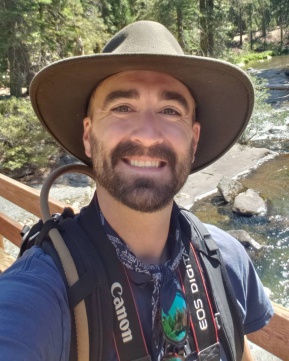Graduate Spotlight: Meet John Barnard
Austin Community College District (ACC) celebrates a record number of graduates at its 2020 fall commencement with a virtual ceremony Saturday, December 12. Our graduates are sharing their own stories about their experience at ACC and their goals for the future in a special graduate series.
In this edition, graduate John Barnard shares his story.
Written by: John Barnard, ACC GIS Graduate
 In January 2018, I decided to enroll in the Austin Community College (ACC) Level 1 GIS Certificate Program, because I wanted to have more formal instruction in managing geospatial data and using ESRI’s ArcGIS software. Before enrolling I had taken one GIS course during my master’s degree coursework. During the process of completing the required coursework, the GIS faculty at ACC were always willing to answer any questions I had and regularly scheduled virtual check-ins through Google Meetups. These two factors greatly helped in completing all the required course work in an online format.
In January 2018, I decided to enroll in the Austin Community College (ACC) Level 1 GIS Certificate Program, because I wanted to have more formal instruction in managing geospatial data and using ESRI’s ArcGIS software. Before enrolling I had taken one GIS course during my master’s degree coursework. During the process of completing the required coursework, the GIS faculty at ACC were always willing to answer any questions I had and regularly scheduled virtual check-ins through Google Meetups. These two factors greatly helped in completing all the required course work in an online format.
As a soon to be graduate of the program, I thought I would share a few tips for new students coming into the program.
1. Use all the organization tools available to you as an ACC student: Google Calendar is a great tool for keeping track of assignments, test, and project due dates. Look over the course syllabus at the start of the semester and note when assignments, tests, and projects are due. Also, use Google Drive to create separate folders for each class and separate ones within for storing data, lecture slides, lab assignments, etc.
2. Make a schedule and stick to it: If you know you can only allow an hour or two a day to the course, that is okay. Just make sure you stay on track through the semester. Also, have a study area where you will regularly work. Treat the coursework like a job and each day you must show up and make some progress.
3. Take advantage of the instructor’s office hours or open lab time: They are there to help you. Also, reach out to other members of your class to see if they figured out the correct way to complete a task. This helps everyone as it teaches collaboration. Something you all will be doing in the workforce.
4. Take advantage of ESRI’s free tutorials: You also can save the certificates as you progress through each one. You can upload these to career sites like LinkedIn to show potential employers what specific skills you have.
5. Finally, stay curious: As your GIS skill progress, you will no doubt want to put them to use to study relationships and map things that are of particular interest to you. Go for it!
I have greatly enjoyed getting to know all the ACC GIS Faculty these past 2 years. Thanks to you all, I am more prepared for a career in the geospatial data field. Currently I am working for the City of Austin – Department of Aviation Environmental Affairs and incorporating GIS into my day-to-day workflows and tasks.